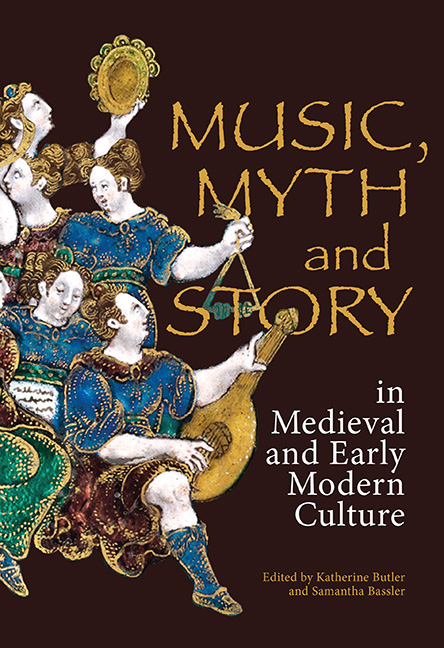Book contents
- Frontmatter
- Contents
- List of Illustrations
- List of Contributors
- Editors’ Note
- Introduction
- I MYTH IN MEDIEVAL MUSIC THEORY AND PHILOSOPHY
- II ICONOLOGIES OF MUSIC AND MYTH
- 4 The Harmonious Blacksmith, Lady Music and Minerva: The Iconography of Secular Song in the Late Middle Ages
- 5 Foolish Midas: Representing Musical Judgement and Moral Judgement in Italy c.1520
- III MYTHS IN RENAISSANCE PHILOSOPHIES OF MUSIC
- IV MYTH AND MUSICAL PRACTICE
- V NARRATIVES OF PERFORMANCE
- VI MYTH AND MUSIC AS FORMS OF KNOWLEDGE
- VII RE-IMAGINING MYTHS AND STORIES FOR THE STAGE
- Bibliography
- Index
- Studies in Medieval and Renaissance Music
5 - Foolish Midas: Representing Musical Judgement and Moral Judgement in Italy c.1520
from II - ICONOLOGIES OF MUSIC AND MYTH
Published online by Cambridge University Press: 24 October 2019
- Frontmatter
- Contents
- List of Illustrations
- List of Contributors
- Editors’ Note
- Introduction
- I MYTH IN MEDIEVAL MUSIC THEORY AND PHILOSOPHY
- II ICONOLOGIES OF MUSIC AND MYTH
- 4 The Harmonious Blacksmith, Lady Music and Minerva: The Iconography of Secular Song in the Late Middle Ages
- 5 Foolish Midas: Representing Musical Judgement and Moral Judgement in Italy c.1520
- III MYTHS IN RENAISSANCE PHILOSOPHIES OF MUSIC
- IV MYTH AND MUSICAL PRACTICE
- V NARRATIVES OF PERFORMANCE
- VI MYTH AND MUSIC AS FORMS OF KNOWLEDGE
- VII RE-IMAGINING MYTHS AND STORIES FOR THE STAGE
- Bibliography
- Index
- Studies in Medieval and Renaissance Music
Summary
IN an ancient story told by Ovid in the Metamorphoses, the Phrygian King Midas, freshly released from his famous golden touch, retreats to the hills and becomes a devotee of the rustic god Pan. Enjoying the acclaim of the nymphs and of Midas for his piping, Pan challenges Apollo – another, much greater, god of the countryside – to a musical contest. The judge of the contest, the mountain Tmolus, declares Apollo the winner; but Midas disagrees, holding Pan to be the better musician. In anger, Apollo changes Midas's ears into those of an ass.
This story presents an account of the operation of musical judgement that is rich and ideologically charged, in such a way that it could readily serve as a touchstone text for a set of principles that were central to the discourse on musical taste in Italy in the fifteenth and early sixteenth centuries. Midas is involved not as a performer, but as a bystander who attempts to pass judgement on the competitors. The outcome of the contest is obvious – Ovid states at the outset that it is ‘unequal’ (inpar). On the one hand, Pan's instrument is identified by Ovid as ‘rustic pipes’ (calamis agrestibus), and his champion Midas as ‘foolish’ (stultae) and ‘barbarous’ (barbaricoque), equipped with ‘uncultivated ears’ (aures … stolidas). On the other hand, Apollo has golden locks, a laurel wreath from Parnassus, purple robes and a beautifully decorated lyre; Tmolus's ‘judgement’ (iudicium) in Apollo's favour satisfies all save Midas. Pan is required by Tmolus to make his pipe ‘submit’ (submittere) to the lyre. The punishment inflicted by Apollo upon Midas serves to make his internal deficiencies evident in his physical form. The entire story follows on directly from that of Midas's golden touch, as a second example of Midas's stupidity; his poor musical judgement is further evidence of his poor judgement in general.
The argument of this study is that the myth of the judgement of Midas was presented and encountered by Italians c.1520, in both literary and visual modes, reshaped and retold in ways that engaged with the broader contemporary discourse on musical judgement.
- Type
- Chapter
- Information
- Music, Myth and Story in Medieval and Early Modern Culture , pp. 87 - 104Publisher: Boydell & BrewerPrint publication year: 2019

